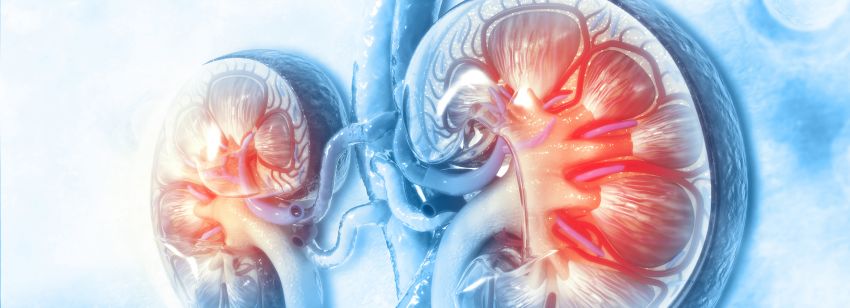Alport syndrome
Rare Disease Day 2022
This chronic inflammation is caused by a mutation in genes that are responsible for the formation of special type IV collagen-containing structures in the body. One of these structures is the glomerular basement membrane in the kidney, which acts as a kind of filter, ensuring that only primary urine is excreted and retaining blood components and proteins. In Alport patients, however, this collagen-containing filter is damaged, allowing uncontrolled and unphysiological passage of proteins, triggering a series of endogenous inflammatory signaling cascades. These permanent inflammatory responses lead to fibrosis, which progressively damages the basement membrane and surrounding tissue even further. Ultimately, the disease inevitably leads to renal failure.
The dramatic aspect of Alport syndrome is the fact that due to continuous stress on the kidneys, they often begin to fail at a young age. Thus, 10-20% of patients are younger than 18 years of age at this time and the median age at onset of kidney failure is 38 years. However, the kidneys are not the only organs affected by the genetically damaged collagen. Type IV collagen is also found in the basement membrane in the inner ear and in the eye lens, cornea and retina. Thus, many Alport patients also suffer from characteristic hearing and visual impairment or loss.
The disease causes enormous physical and also psychological stress for the patients. Patients, when asked about their most distressing symptoms, report states of exhaustion that severely interfere with their daily lives, depression and fear of the consequences of kidney failure, and hearing loss that can be accompanied by social isolation.
Looking at the current state of care, it is clear that novel medications urgently need to be developed and brought to market. Affected individuals are currently treated purely symptomatically - without addressing the underlying inflammation. For example, hearing loss is treated symptomatically with hearing aids, and the burden on the kidneys is reduced with antihypertensive drugs such as ACE inhibitors (angiotensin-converting enzyme inhibitors) and ARBs (angiotensin II receptor blockers). The antihypertensive drugs can often delay kidney failure in affected individuals by several years. However, they are not tolerated by all patients and have side effects that often manifest themselves in dizziness and circulatory problems in young people, further limiting their already impaired quality of life.
SKC consulting is committed to ensuring that new drugs for rare diseases enter the German healthcare market and thus improve care for affected patients. Therefore, we report on selected rare diseases in this blog series for the Rare Disease Day.
Sources:
- National Kidney Foundation, 2019, "The Voice of the Patient – Externally led patient-focused drug development meeting on Alport Syndrome"
- Wilson A, Hariri A, DasMahapatra P. Burden of Alport syndrome in the United States: A retrospective observational cohort study using Optum de-identified electronic health record data. American Society of Nephrology Congress; Virtual 2020.
- Alport.de
- Alport Selbsthilfe
